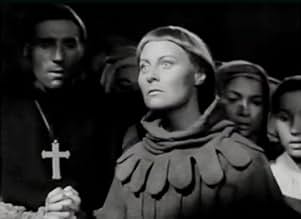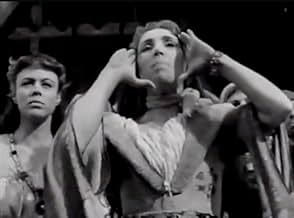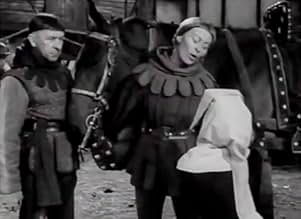Añade un argumento en tu idiomaThree stories, following three very different women from history: Lysistrata, a dancer from ancient times; Joan of Arc, medieval warrior; and Elisabeth, an American war widow who goes on a p... Leer todoThree stories, following three very different women from history: Lysistrata, a dancer from ancient times; Joan of Arc, medieval warrior; and Elisabeth, an American war widow who goes on a pilgrimage to Italy.Three stories, following three very different women from history: Lysistrata, a dancer from ancient times; Joan of Arc, medieval warrior; and Elisabeth, an American war widow who goes on a pilgrimage to Italy.
Argumento
Reseña destacada
A portmanteau movie,made of three sketches flouting chronology ,since the first segment takes place just after WW2 whereas the final segment takes us back to,so to speak ,Aristophane .The main thread is " women through the war' as a man whose face we never see warns us:"you don't know me,just call me destiny!I want you to meet three women :Elizabeth,a victim of the war,Jeanne,who made war and Lysistrata,who fought against the war."The connection between the segments is somewhat tenuous though.
Segment one :"Elizabeth" a routine military melodrama ,"to each his own " style ,the short has emotion and sensitivity going for it;it was one of Claudette Colbert's few European parts (her most famous here is Madame DE Montespan in Sacha Guitry's " Si Versailles M'Etait Conté ) and she gives a restrained performance,displaying a quivering sensitiveness .Colbert Portrays a war widow,coming to Italy to take the remains of her husband killed in a small village where a peasant (Eleonora Rossi-Drago)gave him a shelter.There's a good chemistry between the American and the Latin actress and Marcello Pagliero's directing is effective when it does not succumb to some clichés such as the stormy night(s).Prologue and epilogue in the cemetery are a nice tribute to the American soldiers killed in action .And this line of Colbert is moving: "his father will be near him".
Segment two :"Jeanne" :you've guessed it ,the Jeanne in question is the maid of Orleans ,who else?one of the greatest tales of French history told and told and told and TOLD.So it is to Jean Delannoy's credit to spare us Domremy,the king in Chinon,Orleans,Reims ,Rouen ,Reims and the stake .Delannoy 's story which happens in a couple of hours is the beginning of the end when Jeanne had her moments of doubt and fear .Charles The Seventh had almost let her down and she would have to continue the fight with a handful of soldiers .Delannoy's directing,which the Nouvelle Vague trashed in a shameful way,is up to scratch and the dreary landscape (created in studio) reflects Joan's debacle .The lines by Aurenche and Bost show Jean Anouilh's influence ("L'Alouette" ,his play about Joan was staged the year before).But Delannoy was a believer and when Joan is about to give up,she becomes a miracle worker:a baby ,dead before christening ,to his mother's great despair ,comes back to life for a short while in the heroine's arms.
The main problem is the choice of the actress:Michèle Morgan,34 at the time,was twice Joan's age and it shows !She was obviously too old for the part and Otto Preminger did not make the same mistake with Jean Seberg.A moment of real happiness: fabulous Andrée Clément plays the small part of the mother ;she had already teamed up with Morgan and Delannoy ("La Symphonie Pastorale" ) :in her memoirs ,Morgan speaks highly of her co-star :" La Symphonie Pastorale" belongs to her ,it's her film,not mine"
Segment three:"Lysistrata".It's a big disappointment,mainly when so many great names are involved :Christain -Jaque,his then-wife Martine Carol,Raf Vallone and Henri Jeanson ! It's the first time I've found the writer's lines crude and witless .Jeanson was a pacifist ,his anti-militarism was famous,and he was the man who could tell the tale of Lysistrata ,a hippie-before-time ,who urges men to make love not war .But the actors overplay and are almost unbearable ,left by director Christian-Jaque to their own devices .A farce which is not funny at all.If at least they had borrowed from Guitry! The plot:Lysistrata urges Greek women to refuse to give themselves to their husbands till they do not declare peace!A good subject but a bad treatment and an anti-climax.You can leave after "Jeanne",you will not miss a lot!
Segment one :"Elizabeth" a routine military melodrama ,"to each his own " style ,the short has emotion and sensitivity going for it;it was one of Claudette Colbert's few European parts (her most famous here is Madame DE Montespan in Sacha Guitry's " Si Versailles M'Etait Conté ) and she gives a restrained performance,displaying a quivering sensitiveness .Colbert Portrays a war widow,coming to Italy to take the remains of her husband killed in a small village where a peasant (Eleonora Rossi-Drago)gave him a shelter.There's a good chemistry between the American and the Latin actress and Marcello Pagliero's directing is effective when it does not succumb to some clichés such as the stormy night(s).Prologue and epilogue in the cemetery are a nice tribute to the American soldiers killed in action .And this line of Colbert is moving: "his father will be near him".
Segment two :"Jeanne" :you've guessed it ,the Jeanne in question is the maid of Orleans ,who else?one of the greatest tales of French history told and told and told and TOLD.So it is to Jean Delannoy's credit to spare us Domremy,the king in Chinon,Orleans,Reims ,Rouen ,Reims and the stake .Delannoy 's story which happens in a couple of hours is the beginning of the end when Jeanne had her moments of doubt and fear .Charles The Seventh had almost let her down and she would have to continue the fight with a handful of soldiers .Delannoy's directing,which the Nouvelle Vague trashed in a shameful way,is up to scratch and the dreary landscape (created in studio) reflects Joan's debacle .The lines by Aurenche and Bost show Jean Anouilh's influence ("L'Alouette" ,his play about Joan was staged the year before).But Delannoy was a believer and when Joan is about to give up,she becomes a miracle worker:a baby ,dead before christening ,to his mother's great despair ,comes back to life for a short while in the heroine's arms.
The main problem is the choice of the actress:Michèle Morgan,34 at the time,was twice Joan's age and it shows !She was obviously too old for the part and Otto Preminger did not make the same mistake with Jean Seberg.A moment of real happiness: fabulous Andrée Clément plays the small part of the mother ;she had already teamed up with Morgan and Delannoy ("La Symphonie Pastorale" ) :in her memoirs ,Morgan speaks highly of her co-star :" La Symphonie Pastorale" belongs to her ,it's her film,not mine"
Segment three:"Lysistrata".It's a big disappointment,mainly when so many great names are involved :Christain -Jaque,his then-wife Martine Carol,Raf Vallone and Henri Jeanson ! It's the first time I've found the writer's lines crude and witless .Jeanson was a pacifist ,his anti-militarism was famous,and he was the man who could tell the tale of Lysistrata ,a hippie-before-time ,who urges men to make love not war .But the actors overplay and are almost unbearable ,left by director Christian-Jaque to their own devices .A farce which is not funny at all.If at least they had borrowed from Guitry! The plot:Lysistrata urges Greek women to refuse to give themselves to their husbands till they do not declare peace!A good subject but a bad treatment and an anti-climax.You can leave after "Jeanne",you will not miss a lot!
- dbdumonteil
- 13 mar 2011
- Enlace permanente
Selecciones populares
Inicia sesión para calificar y añadir a tu lista para recibir recomendaciones personalizadas
Detalles
- Duración1 hora 54 minutos
- Color
Contribuir a esta página
Sugerir un cambio o añadir el contenido que falta

Principal laguna de datos
By what name was Destinos de mujer (1954) officially released in Canada in English?
Responde





























